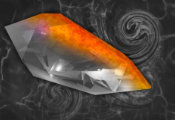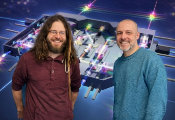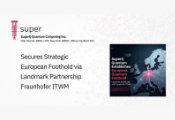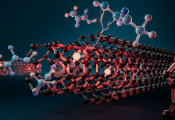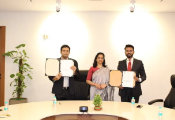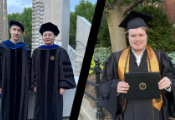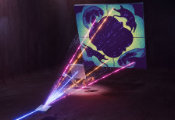Heriot-Watt Quantum Physicist Mehul Malik Honoured With Royal Society of Edinburgh Fellowship
March 24, 2025 -- A quantum physicist at Heriot-Watt University has been elected a Fellow of the Royal Society of Edinburgh, Scotland's national academy of science and letters.
The Fellowship recognises Professor Mehul Malik as one of the most distinguished scientists in his field.
The Royal Society of Edinburgh (RSE) was established in 1783 to deploy knowledge for public good, including helping to tackle the world’s toughest challenges. Its Fellowships recognise individual excellence in fields including physics, chemistry, informatics, literature, law, social sciences, and business.
Professor Malik is Professor of Physics and Royal Academy of Engineering Chair in Emerging Technologies at Heriot-Watt University in Edinburgh, where his research focuses on quantum photonics – a field that explores the use of individual particles of light, or photons, in next-generation technologies for communication, computing and sensing.
He said: “I am greatly honoured to be elected a fellow of the Royal Society of Edinburgh. I look forward to contributing to the work of the RSE and using this platform to create positive change in Scotland and the wider world.”
Professor Malik will join around 1,800 RSE Fellows who are leading experts in the sciences, arts, business, professions and the third and public sectors, with links to Scotland. Past Fellows of the RSE include theoretical physicist Peter Higgs, James Clerk Maxwell, who is most famous for his theory of electromagnetism, and American scientist and statesman Benjamin Franklin.
The work of RSE Fellows involves sharing their knowledge and expertise across multiple disciplines. This includes providing informed policy advice to government bodies and working in multidisciplinary teams to address complex challenges in areas like the economy, education and the environment.
To be elected as an RSE Fellow, candidates are assessed across three dimensions of excellence – outstanding achievement, professional standing and societal contribution. Accepting a Fellowship involves devoting time and effort to the Society’s mission of making knowledge made useful, whether at a local, national or international level.
Professor Malik has published more than 55 papers in the field of quantum optics and quantum information, where his research interests include quantum entanglement, quantum networks, quantum imaging, quantum information and structured light.
Quantum entanglement is when two or more particles – such as photons or atoms – remain connected even when they're separated by vast distances.
Quantum technology involves harnessing the physics of quantum particles of light and matter to develop ultra-high performance applications including more powerful computing, unconditionally secure communications and more reliable navigation systems.
Professor Malik’s Fellowship is one of more than 40 Fellowships being announced today by the Royal Society of Edinburgh.
Other recipients include Professor Minhyong Kim Director of the International Centre for Mathematical Sciences, which supports research in the mathematical sciences and is wholly owned by Heriot-Watt University and the University of Edinburgh.
She is joined by His Royal Highness the Duke of Edinburgh – Prince Edward – Hubble Telescope scientist, Professor Asad Madni; cartoonist and artist Kate Charlesworth; Professor Patricia Findlay, professor of work and employment relations at the University of Strathclyde and David Field, Chief Executive of the Royal Zoological Society of Scotland, which runs both Edinburgh Zoo and the Highland Wildlife Park.
President of the Royal Society of Edinburgh, Professor Sir John Ball PRSE, said: “It is my sincere pleasure to welcome each of our new Fellows – from the worlds of academia, public service, business, and the arts – to Scotland’s National Academy.
“They represent excellence in their fields and will reinforce our ability to tackle the challenges that Scotland, and indeed the wider world, faces now and in the future.
“Across a range of disciplines, they have each shown an unshakeable commitment to their research, work or craft, and it is exactly this superlative level of accomplishment that makes them belong as Fellows of the RSE.”

